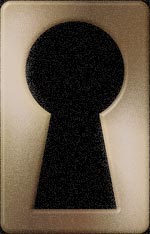Across from the Family Library were two guest rooms which had been divided in the previous decade by a small hallway leading to a window over the north portico – perfect for the President’s impromptu serenades.
In one of these guest bedrooms, Mrs. Lincoln spent the days after her husband’s assassination, having decided not to reenter the rooms she and her husband had previously occupied. “Oh, I couldn’t go in there,” she told friends who brought her back to the White House from the Peterson house where the President had died. Her loud and intense grief was alleviated only by the petitions of young Tad: “Don’t cry so, Mama, or you will make me cry too.” Benjamin French stopped in to see her the morning after President Lincoln’s assassination: “We entered the gate very soon after the President’s remains were taken in, and I went immediately to the room where they were and saw them taken from the temporary coffin in which they had been brought there. I went in, at the request of someone, to see Mrs. Lincoln. She was in bed, Mrs. Welles being alone with her. She was in great distress, and I remained only a moment.”1
Robert Lincoln generally stayed in one guest bedroom when he was in Washington, which was not very often. But he was in his bedroom the night in February 1864 when Salmon Chase sent President Lincoln his resignation because of embarrassment over Chase’s presidential supporters. After Mr. Lincoln showed his son the letter from the Treasury Secretary, he “asked me to lay out writing materials for him, and at my table he wrote a short note to Mr. Chase in which he said in substance ‘that he knew of no reason why he should not remain in the Cabinet.’ Upon his showing this note to me I expressed surprise, at that part of the note here specified and asked him if he had not seen the [Pomeroy] circular. He stopped me and said he didn’t know anything about it; that a good many people during the day had tried to see him and tell him something which he supposed was some new sign of Chase’s deviltry, and it did not suit him to know any thing about it, and that therefore the remark in his letter declining to accept his resignation was strictly true. Thereupon at his request I called a messenger, and the note to Mr. Chase was sent.”2
Robert had arrived back in Washington on April 14, 1865, the day his father was assassinated. In Thirty-Six Years in the White House, Thomas Pendel related how he told Captain Robert Lincoln that his father had been shot:
I immediately hurried upstairs, leaving [Commissioner of Agriculture Isaac Newton] on the inside, and went to Captain Robert Lincoln’s room. He had just come from the front that morning, where he had been doing duty on the staff of General Grant.
That room was directly over the front portico. When I got into his private room, he did not seem to be feeling very well and had a vial in one hand containing medicine and a teaspoon in the other, as if he was about to take a dose of medicine.
As I stepped up to his side the teaspoon and the vial seemed to go involuntarily down to the table, and he did not take the medicine. I wanted to approach the subject gently and break the news to him about his father. So I simply said, ‘Captain, there has something happened to the President; you had better go down to the theatre and see what it is.”3
Footnotes
- Donald B. Cole and John J. McDonough, editors, Witness to the Young Republic: A Yankee’s Journal, p. 470.
- Michael Burlingame, editor, An Oral History of Abraham Lincoln: John G. Nocolay’s Interviews and Essays, p. 89.
- Thomas Pendel, Thirty-Six Years in the White House, pp. 43-44.
Visit
Salmon P. Chase
Elizabeth Grimsley
Anson Henry
Robert Todd Lincoln
Mary Todd Lincoln
Isaac Newton
John Hay
Noah Brooks
Thomas D. Lincoln
Elizabeth Keckley
Thomas Pendel









